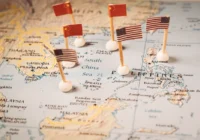Vladimir Putin fails to acknowledge his role in the Flight MH17 disaster.
The eastern Ukrainian village of Hrabove, or Grabovo — in a twist of morbid irony only one letter away from having the word “coffin” in its name (“grob” in Russian) — is a scene of devastation and loss not seen in Europe since the Lockerbie disaster of 1988. Debris from the Malaysian Airlines Flight MH17 is scattered over the rolling fields, carefully combed through by local miners desperate to help.
Shocked residents describe bodies falling from the sky, a woman’s shed perforated by one of the victims. The plane was shot down on July 17. Two days later, the body was still lying there, among the wreckage, under the grim sky seen through the hole he made in the roof. That is someone’s loved one, left alone in this state of indignity by forces in control on the ground.
There are numerous versions circulating regarding who was responsible for bringing down the civilian aircraft. There is the obligatory official finger-pointing of the Russian and Ukrainian governments at one another. The widely-circulated suggestions, apparently by the Russian Federal Aviation Agency (Rosaviation), that President Vladimir Putin’s flight from Latin America had been the original target. The outright bonkers conspiracies on the Russian Internet connecting the missing Malaysian Airlines Flight MH370, US special forces, fake passports and “strange” Facebook profiles of victims.
And the most credible version of them all: That the tragedy was a result of a mistake by pro-Russian rebels in eastern Ukraine, who thought they had brought down a Ukrainian military plane and bragged about it on the Internet with the phrase: “We told them not to fly over our skies.”
But this isn’t about who operated the BUK missile launcher that caused the disaster. This is about the cynicism, the disregard for human life and suffering that has been the staple approach of Putin since his ascent to power.
It is difficult to forget the tension and horror the people of Russia — or at least the Russians I know — felt while watching the abandonment of 118 crew members of the nuclear submarine, Kursk, as they were left to suffocate at the bottom of the Barents Sea due to Moscow’s refusal to help in the rescue operation. It took Putin five days to interrupt his summer vacation, as the country held its breath in hope that sailors who were still alive might be rescued. His impossible-to-forget response to Larry King’s question of what happened to the submarine was a smirking: “It sank.”
Putin’s unflinching, Botox-paralyzed face appropriates blame without a trace of empathy — his drooping, cold eyes seemingly unaware of his role, and that of his policies, in the crises at hand.
Putin’s jailhouse slang in reference to Chechen fighters, whom he famously ordered “wasted in the outhouse,” is one thing. But the senseless waste of life during the school siege in Beslan, or the taking of the Dubrovka theater in Moscow during a counterterrorism operation, which killed more than 300 and 130 hostages respectively, is something entirely different.
Stalin famously quipped that one death is a tragedy, a million a statistic. As Russia goes from tragedy to tragedy, terrorist attack to terrorist attack, and crash to crash, Putin’s unflinching, Botox-paralyzed face appropriates blame without a trace of empathy — his drooping, cold eyes seemingly unaware of his role, and that of his policies, in the crises at hand.
What is different about the crash in Ukraine is that the whole world is watching. It watches as Russia’s president lays blame on the “country of origin,” as if it wasn’t widely known that the accumulation of Russia’s military equipment and personnel on Ukraine’s border and its proliferation to the rebels, who have shot down numerous aircraft since the start of the conflict, is a major factor in this tragedy.
As if the Kremlin’s underhand support for the separatists, as it calls them, isn’t fueling the devastating conflict that has so far claimed over 1,000 lives. As if the same rebels who are wrecking havoc on the MH17 crash site, with reports of bodies being dragged to unspecified locations asinternational experts are denied access by drunk men with Kalashnikovs, are not a Frankensteinian product of Putin’s — to borrow from Angela Merkel — disengagement from reality.
What is at stake here, following the squabble over body parts and black boxes, with some reports of marauding and further unthinkables, is the price of human dignity. Commentators have called this Putin’s Lockerbie, or equated it to the 1983 downing of the Korean “spy plane” that further weakened the Soviet Union’s already frail international position.
As Moscovites lay flowers in front of the Dutch Embassy, with notes spelling out “forgive us,” the honorable, humane thing to do would be for Putin to not only take a firm stand on the issue and demand full access and total transparency from the rebels, but to reconsider the consequences of his actions on a broader scale. He might just be the only one capable of wielding any influence over the separatists, even though the chaotic nature of the conflict may well have snowballed past his power of persuasion.
Yet somehow, looking back at his track record in dealing with human suffering, the terse moment of silence at the press conference might be the best the 298 victims of Flight MH17 will get.
*[A version of this article was originally published in The Moscow Times.]
The views expressed in this article are the author’s own and do not necessarily reflect Fair Observer’s editorial policy.
Support Fair Observer
We rely on your support for our independence, diversity and quality.
For more than 10 years, Fair Observer has been free, fair and independent. No billionaire owns us, no advertisers control us. We are a reader-supported nonprofit. Unlike many other publications, we keep our content free for readers regardless of where they live or whether they can afford to pay. We have no paywalls and no ads.
In the post-truth era of fake news, echo chambers and filter bubbles, we publish a plurality of perspectives from around the world. Anyone can publish with us, but everyone goes through a rigorous editorial process. So, you get fact-checked, well-reasoned content instead of noise.
We publish 2,500+ voices from 90+ countries. We also conduct education and training programs
on subjects ranging from digital media and journalism to writing and critical thinking. This
doesn’t come cheap. Servers, editors, trainers and web developers cost
money.
Please consider supporting us on a regular basis as a recurring donor or a
sustaining member.
Will you support FO’s journalism?
We rely on your support for our independence, diversity and quality.







Comment